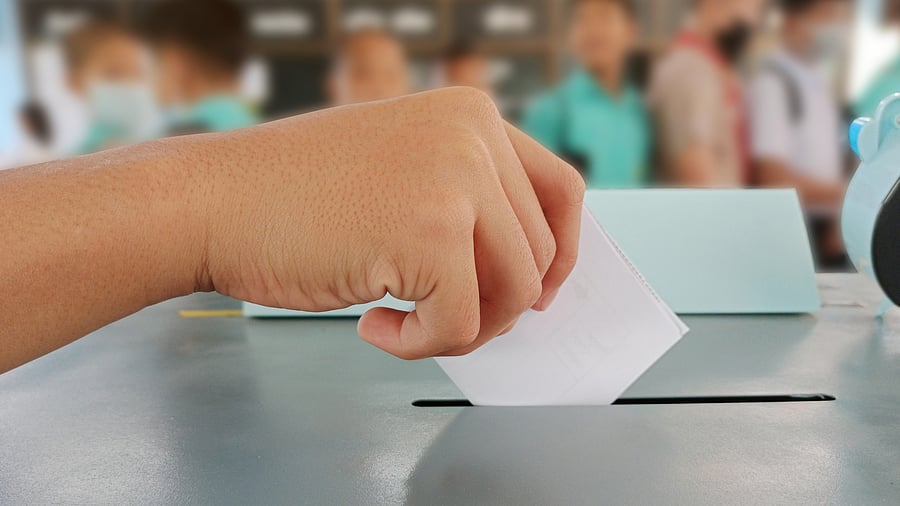
Representative image for student elections
Credit: iStock Photo
The Karnataka government’s proposal to reintroduce student elections in colleges and universities has reignited a long-dormant debate about campus politics and the kind of citizens our educational institutions are shaping. After over three decades of a ban, the move is being considered following a proposal from the National Students’ Union of India (NSUI) and a nudge from Congress leader Rahul Gandhi, who reportedly urged the government to cultivate leadership among students. Chief Minister Siddaramaiah and Deputy Chief Minister D K Shivakumar have signalled intent. However, university administrators remain wary, warning that the return of campus polls could bring back violence, groupism, and political interference. These concerns are not unfounded, but they also raise a deeper, more urgent question: What is lost when we silence student voices in the name of stability?
Student elections in Karnataka were banned in 1989, following a few violent incidents. But since then, the state has undergone massive political, social, and educational transformations. Today, the push for reintroducing student unions is not just nostalgic; it speaks to a growing recognition that student leadership is not a threat to academic life but potentially its most vital force. Many Indian states and cities, such as Kerala, Maharashtra, West Bengal, and particularly Delhi, have continued to hold student elections. Their experiences offer Karnataka both a cautionary tale and a roadmap.
The case for reintroducing student elections rests on a foundational democratic principle: participation. A university is not merely a site for acquiring knowledge but also a space where students learn to negotiate power, voice dissent, and imagine a better society. Elections help institutionalise this spirit. In places like Jawaharlal Nehru University and Delhi University, student unions have historically played pivotal roles in defending academic freedom, improving student welfare, and demanding administrative accountability. For example, the JNU Students’ Union has successfully intervened in policies around fee hikes, hostel allocations, and anti-discrimination measures. These student bodies often act as intermediaries between the administration and the student community, amplifying concerns, channelling grievances, and organising collective action.
Critics, however, highlight the risks and serious concerns: violence, politicisation, and academic disruption. In states like Rajasthan and Punjab, the return of student elections has sometimes led to aggressive factionalism, clashes, and even criminal allegations against candidates. In Delhi, the DU Students’ Union elections have occasionally been marred by large-scale spending, mob clashes, and interference from major national parties. The 2015 DUSU elections saw such intense political rivalry that the university cancelled its presidential debates amid security concerns.
However, does this mean we abandon campus democracy altogether? The challenge is not student politics per se, but its distortion. When student bodies become mere proxies for political parties, the educational purpose of their existence collapses. However, Karnataka can, and must, learn from these experiences to build a better, more accountable model.
The Lyngdoh Committee, set up by the Supreme Court in 2006, has already provided a robust framework to regulate student elections. It prescribes age limits, caps on campaign spending, and bans on candidates with criminal records, and insists on fair and peaceful campaigning. If effectively implemented and monitored, these guidelines can act as strong guardrails against the degeneration of student democracy into a power struggle.
States like West Bengal have gone further, experimenting with “apolitical” student councils that ban political party names, symbols, and slogans. While such models have been critiqued for being over-sanitised or undemocratic, they offer one way to prevent external interference without silencing student representation. The key is not to depoliticise students but to allow them to develop their political consciousness organically, within ethical and civic bounds. After all, the purpose of education is not just to produce employable graduates but thinking citizens capable of engaging with democracy in all its complexities.
Today, campuses often feel colder. Many students express hesitation in raising their voices for fear of administrative reprisals. Activism is viewed with suspicion; leadership is seen as a disruption. The result is a generation of students who may be bright and qualified but less practiced in disagreement, negotiation, or civic courage.
In this context, Karnataka’s proposal can be seen not just as a political move but as an educational reform. With adequate safeguards, transparent monitoring, and a commitment to student welfare, campus elections could become training grounds for the next generation of India’s democratic leaders. The goal is not to manufacture politicians but to cultivate informed, engaged citizens. To get there, universities must not act from fear but from vision. Vice chancellors and faculty have a critical role in regulating the process, mentoring student leaders, ensuring equity, and promoting a culture of dialogue over division. Faculty-guided debates, issue-based campaigns, and promoting civic values over party loyalty can help build a new grammar for student politics—one that is democratic, not demagogic.
Ultimately, the question is not whether student elections are risky; it is whether we believe our students can use voice over violence, ideas over ideology, and responsibility over rhetoric. The Karnataka government’s rethink is a chance to trust students again—to let them participate, lead, and learn. In a democracy as young, noisy, and urgent as ours, that trust may be the best education we can offer.
(The writer is a former professor and dean of a Bengaluru-based university)